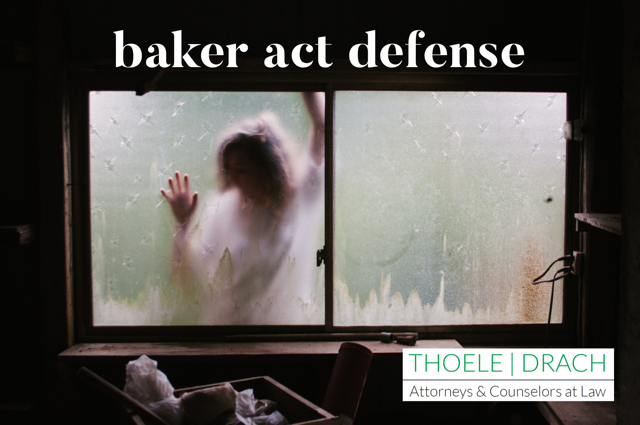
Since 2015, Thoele | Drach has developed a state-wide reputation as being the Baker Act defense firm. No other firm has the resources to respond aggressively to these highly specialized cases that are fraught with pitfalls at every twist and turn. This post is the first in a series on the Florida Mental Health Act of 1971, commonly known as the “Baker Act,” which allows the involuntary institutionalization and examination of an individual.
A person being held under the Baker Act does have rights. Under Florida Statute 394. 463(2)(i)(1)-(4), when a person is the subject of an involuntary examination, he/she can be held in a facility for a maximum of 72 hours. During this period of time physicians and counselors will examine and interview the patient to determine his/her mental state and the type and duration of further treatment that may be needed, including further involuntary confinement.
Many facilities and administrators are mistaken in their understanding of the Baker Act’s requirements and oftentimes interpret the Baker Act in favor of obtaining additional days of insurance benefits. To obtain these additional days, facilities and administrators routinely claim that they do not release patients or a psychiatrist is not available on the weekends. Florida Administrative Code 65E-5.351(3) Minimum Standards for Designated Receiving Facilities, requires that “[e]ach receiving facility shall assure that its reception, screening, and inpatient services are fully operational 24-hours-per- day, 7-days-per-week.”
The Baker Act requires release if a patient is examined and determined to be releasable earlier than the 72-hour examination period. The facility must, within the 72 hours, do one of the following things:
1. Release the patient without condition;
2. Release the patient for voluntary outpatient treatment;
3. Request that the patient give consent to being admitted for voluntary inpatient treatment;
4. File a petition for involuntary placement with the appropriate circuit court when outpatient or inpatient treatment is necessary, but the patient refuses to consent.
In most cases, patients have family or friends that can help. Florida Statute 394.459(2)(b) states that “[i]t is further the policy of the state that the least restrictive appropriate available treatment be utilized based on the individual needs and best interests of the patient and consistent with optimum improvement of the patient’s condition.” The Baker Act specifically states that involuntary confinement is not appropriate when any apparent harm “may be avoided through the help of willing family members or friends . . . .” Florida Statute 394.463(1)(b)(1).
If you or someone you know is being held under Florida’s Baker Act and you believe it was done improperly, it is important to consult with an attorney experienced in this area, like the attorneys at Thoele | Drach, to discuss your or your loved one’s rights under the Baker Act.

